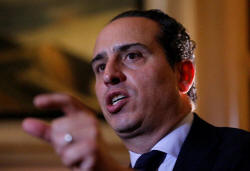|
NAFTA nations plan talks
progress under barrage of Trump threats
 Send a link to a friend
Send a link to a friend
 [August 31, 2017]
By Dave Graham [August 31, 2017]
By Dave Graham
MEXICO CITY (Reuters) - Trade negotiators
plan to take small steps forward in a second round of talks to rework
the North American Free Trade Agreement (NAFTA) this weekend, trying to
ignore daily threats from U.S. President Donald Trump to tear it up if
he does not get his way.
Trump has used Twitter, press conferences and speeches to attack NAFTA
in recent days, a ploy Mexican and Canadian officials regard as a
negotiating strategy to wring concessions, but which has heightened
uncertainty over the accord.
"Hopefully we can renegotiate it, but if we can't, we'll terminate it
and we'll start all over again with a real deal," Trump told cheering
workers at a factory in Missouri on Wednesday, as Mexico's foreign and
trade ministers met their U.S. counterparts in Washington to keep
relations on track.

Away from the diplomatic noise, trade experts from the three NAFTA
nations hope to advance the revamp during the five days of talks in
Mexico that start on Friday by working through areas of greater
consensus before turning to trickier issues.
"We want to see positive signs of progress at the negotiating tables,"
said Moises Kalach, head of the international negotiating arm of
Mexico's CCE business lobby, which is leading the private sector in the
talks. "Hopefully we'll get it, even if it doesn't have to be stated
publicly. Hopefully we'll start getting closure on some issues."
Overall, the Mexican round, which follows talks two weeks ago in
Washington, is expected to define more clearly the priorities of each
nation rather than yield major breakthroughs.
The emergence of detailed positions on the tougher points looks less
likely in this round, officials said.
Kalach and one Mexican negotiator, who spoke on condition of anonymity,
saw broad agreement between the NAFTA members on how to improve
conditions for small businesses, as well as in salvaging elements of the
Trans-Pacific Partnership (TPP) trade accord that Trump ditched after
taking office.
Some consensus was forged between the three countries when the TPP was
finalized in 2015 on issues including the environment, anti-corruption,
labor rules and digital trade.
More divisive issues that could enter the talks range from exploring the
scope to raise NAFTA content requirements for autos to the contested
U.S. demand to scrap the so-called Chapter 19 dispute settlement
mechanism for resolving complaints about illegal subsidies and dumping,
officials say.
A key plank of the U.S. strategy is how to reduce its trade deficit with
Mexico, which has sent negotiators scrambling for creative ways to
rebalance trade, Kalach said.

One hope is that Mexico's incipient oil and gas sector opening will
result in more imports and infrastructure investment from U.S.
companies, some of which have already entered the market, such as Exxon
Mobil Corp and Chevron Corp.
[to top of second column] |


Folding that reform into NAFTA in a way that would make any attempt to unwind it
politically costly for a future Mexican government would give U.S. and Canadian
investors more security, Kalach and the Mexican negotiator said.
The risk the reform will stall has preoccupied officials in the region because
the current front-runner for Mexico's July 2018 presidential election, Andres
Manuel Lopez Obrador, opposed the opening of the energy industry.
"The best thing (the United States and Canada) can do is protect NAFTA because
this essentially protects their investments," said Kalach.
THROWING WORDS ABOUT
Trump has accused Mexico and Canada of being "very difficult", and officials
from both countries say his words come as little surprise given his
confrontational negotiating style.
Still, Mexico's government has touted a back-up plan, seeing a "high risk" that
NAFTA could unravel.
Canada's Prime Minister Justin Trudeau on Tuesday shrugged off the threats and
Canadian officials close to the process said they remained fully focused on the
talks.
"There are always going to be words thrown about here and there but ... we will
continue to work seriously and respectfully to improve NAFTA to benefit not just
Canadians but our American and Mexican friends as well," Trudeau said.

A spokeswoman for U.S. Trade Representative (USTR) Robert Lighthizer declined to
comment directly on how Trump's comments would affect the talks. However, trade
experts say they are unlikely to foster a spirit of cooperation.
"I think his tweets and statements are just complicating what's already a
difficult negotiation," said Wendy Cutler, a former deputy USTR and lead U.S.
negotiator for the TPP.
"I think it will embolden the naysayers in Canada and Mexico who don't want to
move in certain areas by telling the negotiators, 'don't move on these issues
because the president has already said he probably won't sign off on this
deal'".
(Additional reporting by David Lawder in Washington, David Ljunngren in Ottawa
and Anthony Esposito in Mexico City; Editing by Frank Jack Daniel and Andrew
Hay)
[© 2017 Thomson Reuters. All rights
reserved.] Copyright 2017 Reuters. All rights reserved. This material may not be published,
broadcast, rewritten or redistributed. |